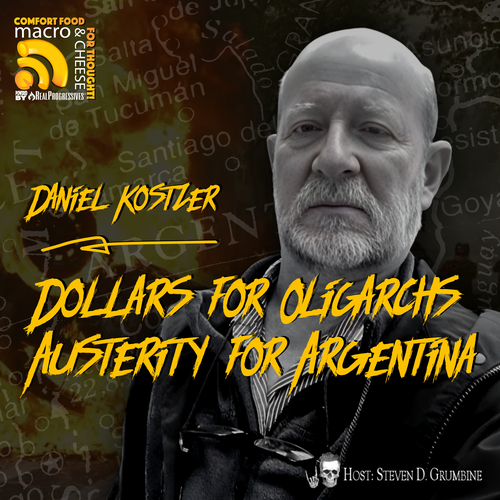Inflation is not some natural economic phenomenon, nor is it merely the result of too much money chasing too few goods. That’s the myth popularized by Milton Friedman and his monetarist acolytes. Rather, inflation is always and everywhere a function of the power of monopolies and capital to manipulate scarcity and extract greater profits from the working class. We’ve seen this reality on full display in recent years, from the pandemic profiteering of 2020-2022 to the ongoing corporate price-gouging under the guise of “supply chain issues” and “inflationary pressures.” As economist Isabella Weber demonstrates in her work on sellers’ inflation, corporations leverage moments of crisis to hike prices far beyond cost increases, not because they must, but because they can. The pandemic was a textbook example: under the cover of public confusion about government spending, firms engaged in brazen price-gouging, with some sectors seeing profit spikes of up to 1000%. Even now, as inflation cools, corporations from PepsiCo to ExxonMobil continue to post record profits while blaming “the economy” for price hikes.
From a Modern Monetary Theory (MMT) perspective, inflation is not caused by government spending in and of itself, but by how that spending interacts with real resource constraints. Warren Mosler, a foundational MMT thinker, argues that inflation occurs when the currency-issuing government chooses to pay higher prices – whether through excessive military expenditures (like the $175 billion in new Ukraine and Israel funding just passed by Congress), poorly targeted subsidies (such as the unchecked corporate bailouts of the CARES Act), or failure to regulate corporate profiteering. Yet mainstream economics, particularly since the Bolshevik Revolution, has deliberately conflated inflation with fiscal profligacy to justify austerity. As Clara Mattei meticulously documents in The Capital Order, the push for austerity economics was not born out of necessity but as a political project to discipline labor and safeguard capitalist hierarchies. It’s a playbook we see repeating today as the Fed jacks up interest rates despite clear evidence that corporate greed, not wage growth, is driving inflation.
The Federal Reserve’s approach to inflation by raising interest rates is not just ineffective but actively counterproductive. Mosler has long argued that the Fed misunderstands inflation entirely. When central banks hike rates, they signal to industry that higher costs are acceptable. They aren’t curbing inflation; they’re embedding it. Worse, higher interest rates redistribute wealth upward. Asset-holders reap windfalls from increased yields while workers face layoffs and wage suppression. When the Fed raised rates to 5.5% in 2023, corporate profits hit record highs while real wages stagnated and layoffs spiked in tech, media, and manufacturing. The Fed’s tools are not designed to stabilize prices for the many, but to protect the financial interests of the few. The class bias is undeniable.
The solution to inflation is not austerity, but structural intervention. If supply chain disruptions drive price surges (as with the ongoing Red Sea shipping crises), the answer is public investment in resilient infrastructure and domestic production, not reliance on exploitative global supply chains. If wages rise after decades of stagnation (as with the UAW’s historic 2023 contract wins), the resulting price adjustments are a one-time recalibration, not runaway inflation. And if artificial scarcity is the culprit, as is blatantly the case in sectors like pharmaceuticals (where insulin price-fixing continues) and housing (where private equity firms hoard homes), then the state should break corporate price-setting power through antitrust action, price controls, and direct public provisioning. In a noncapitalist system, the state would surely take these measures. The refusal to do so is not an economic oversight but a political choice. As Mattei’s work reveals, capitalism relies on the myth of inflation as an uncontrollable force to justify dismantling social programs and suppressing wages. It’s a tactic we’re seeing today as Republicans demand cuts to Social Security and Medicare under the guise of “fighting inflation.”
Under capitalism, inflation is weaponized against the working class. Rising rents (up 30% since 2020), food prices (with “shrinkflation” hitting 95% of grocery items), and energy costs (as oil giants post $200 billion in profits) are wielded as a cudgel to enforce discipline, forcing workers into longer hours, reduced benefits, and precarious gig labor. Yet inflation is not inherently harmful to all. As MMT scholars note, inflation erodes the value of debt, which is a boon to indebted households. The real issue is not inflation itself, but whether wages keep pace. For decades, they haven’t. Capital has seized an ever-larger share of income while labor’s share stagnates, a direct result of weakened unions and systemic attacks on working-class organizations. The recent wave of strikes – from autoworkers to Hollywood actors – show the path forward: militancy works.
The path forward demands we do more than tinker at the edges. Princeton researchers have confirmed what the 2024 election cycle makes obvious: the US is not a democracy but an oligarchy, with policy crafted to serve capital’s interests. Inflation discourse, like all economic narratives under capitalism, is a battleground. To reclaim it, the working class must reject the lie that inflation stems from government generosity (like Biden’s stimulus checks) and instead recognize it as a symptom of capitalist predation. The alternative is not technical policy tweaks, but a fundamental challenge to the capital order – one that replaces private control with democratic planning, and scarcity with solidarity. The recent successes of rent control campaigns in cities like Minneapolis and the growing push for public utilities (as in Maine’s Pine Tree Power initiative) prove another world is possible if we’re willing to fight for it.
References:
- Mattei, Clara. *The Capital Order: How Economists Invented Austerity and Paved the Way to Fascism. (2025)
- Mosler, Warren. The Seven Deadly Innocent Frauds of Economic Policy. (2010)
- Weber, Isabella. “Sellers’ Inflation, Profits and Conflict: Why Can Large Firms Hike Prices in an Emergency?” (2022)
- Federal Reserve Economic Data (FRED) on wage stagnation (2024)
- “Corporate Profits Reach Record High Amid Inflation,” Financial Times (2023)
- Gilens & Page, “Testing Theories of American Politics” (Cambridge University Press,2014)
- Bureau of Labor Statistics reports on rent/food inflation (2024)
- UAW contract analysis (Economic Policy Institute, 2023)










Fantastic breakdown for folks to understand MMT and class as a duo